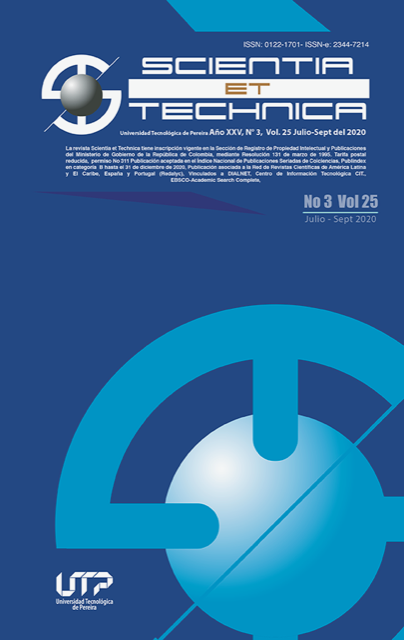Assessment as a Learning instrument in a computer programming course using connecctivism and BBL
DOI:
https://doi.org/10.22517/23447214.22471Keywords:
Aprendizaje, Computación, Conectivismo, Evaluación, ProgramaciónAbstract
This article presents results, analysis and discussion derived from a research made in a Computer Programming course in Systems and Computer Engineering whose objective was to establish comparative criteria that would capitalize the advantages of Connectivism with windows of time, as a learning instrument, in comparison with methodology used normally in class especially in evaluation by individual written exams. We proceeded to work forming four subgroups, from ten subgroups, so each one responds to a different methodology of evaluation to compare them quantitatively and qualitatively. The results show great favorability towards the evaluation methodology supported in Conectivismo. It is concluded that, in a controlled environment, taking advantage of the options provided by the Connectivism, it is possible to achieve the motivation required for a more effective, more lasting learning and more tuned to the natural language of today's young people: technology.
Downloads
References
J. Brune "Actos de Significado". Madrid - España: Alianza Editorial. Año 2009.
J. Bruner, "Hacia una teoría de la instrucción". México: Editorial Limusa. Año 2006.
F. Diaz Barriga, , & G. Hernandez Rojas, "Estrategias docentes para un aprendizaje significativo". México: McGraw Hill. Año 2002.
O. Trejos Buriticá, "Significado y Competencias". Pereira (Risaralda) - Colombia: Editorial Papiro. Año 2012.
D. Ausubel "The Acquisition and Retention of Knowledge." Washington - USA: Springer. Año 2012.
A. Woolfolk, "Psicología Educativa." México: Prentice Hall. Año 1999.
L. Serrano Cámara., M. Paredes Velasco,., & et al. An "evaluation of students motivation in computer supported collaborative learning of programming concepts". Computers in Human Behavior(31), 499 - 508. Año 2014. https://doi.org/10.1016/j.chb.2013.04.030
https://doi.org/10.1016/j.chb.2013.04.030
M. Prince. Does "Active Learning work? Journal of Engineering Education", 93(3), 223-231 . , Julio de 2004. DOI: 10.1002/j.2168-9830.2004.tb00809.x
https://doi.org/10.1002/j.2168-9830.2004.tb00809.x
W. Herrmann "The whole brain bussiness book. New York": McGraw Hill. Año 2015.
A. Ballester Valori, "Meaningful Learning in practice. Islas Canarias": Universitat de les Illes Ballears Año 2011.
A. Davis. "The credentials of brain based learning. Journal of Philosophy of Education", 38(1), 21. Año 20014. DOI: 10.1111/j.0309-8249.2004.00361
https://doi.org/10.1111/j.0309-8249.2004.00361.x
E Jensen,.. "The learning brain. NY": Brain Store Inc. Año 1994
H. Smidt,, M. Thornton,, & A. Kaveh , "The future of social learning": a novel approach to connectivism. Proceedings of the 50th Hawaii International Conference on System Sciences , 2116 - 2125. Año 2017. DOI: 10.24251/HICSS.2017.256
https://doi.org/10.24251/HICSS.2017.256
J. Johannsson, & F. Elgh, "Applying Connectivism to EngineeringKnowledge to Support the AutomatedBusiness." In: 24th ISPE International Conference on Transdisciplinary Engineering (TE2017), 621 - 628. Año 2017. DOI: 10.3233/978-1-61499-779-5-621
O. Trejos Buriticá . "Lógica de Programación." Bogotá: Ediciones de la U. Año 2017
R. Harlterman,. "Learning to program with Python." Washington, USA: Richard Halterman Edit. Año 2011
Downloads
-
Vistas(Views): 671
- PDF (Español (España)) Descargas(Downloads): 660
Published
How to Cite
Issue
Section
License
Copyrights
The journal is free open access. The papers are published under the Creative Commons Attribution / Attribution-NonCommercial-NoDerivatives 4.0 International - CC BY-NC-ND 4.0 license. For this reason, the author or authors of a manuscript accepted for publication will yield all the economic rights to the Universidad Tecnológica of Pereira free of charge, taking into account the following:
In the event that the submitted manuscript is accepted for publication, the authors must grant permission to the journal, in unlimited time, to reproduce, to edit, distribute, exhibit and publish anywhere, either by means printed, electronic, databases, repositories, optical discs, Internet or any other required medium. In all cases, the journal preserves the obligation to respect, the moral rights of the authors, contained in article 30 of Law 23 of 1982 of the Government Colombian.
The transferors using ASSIGNMENT OF PATRIMONIAL RIGHTS letter declare that all the material that is part of the article is entirely free of copyright. Therefore, the authors are responsible for any litigation or related claim to intellectual property rights. They exonerate of all responsibility to the Universidad Tecnológica of Pereira (publishing entity) and the Scientia et Technica journal. Likewise, the authors accept that the work presented will be distributed in free open access, safeguarding copyright under the Creative Commons Attribution / Recognition-NonCommercial-NoDerivatives 4.0 International - https://creativecommons.org/licenses/by-nc-nd/4.0/deed.es license.



